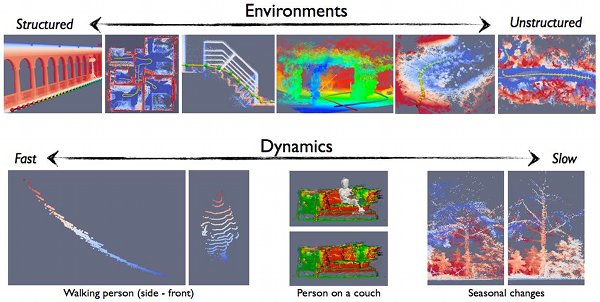libpointmatcher is a modular library implementing the Iterative Closest Point (ICP) algorithm for aligning point clouds. It has applications in robotics and computer vision.
Quick link for the tutorial pages: Tutorials (also available on readthedocs.org).
Those tutorials are written using Markdown syntax and stored in the project's /doc folder. Their scope ranges from introductory material on performing point cloud registration to instructions for the more experienced developer on how to extend the library's codebase.
Libpointmatcher's source code is fully documented based on doxygen to provide an easy API to developers. An example of this API can be found here, but it is suggested to use the one build for your version in doc/html.
libpointmatcher is being developed by François Pomerleau and Stéphane Magnenat as part of our work at ASL-ETH.
You can read the latest changes in the release notes.
Although we suggest to use the tutorials, here is a quick version of it:
The library has a light dependency list:
- Eigen version 3, a modern C++ matrix and linear-algebra library,
- boost version 1.48 and up, portable C++ source libraries,
- libnabo version 1.0.6, a fast K Nearest Neighbour library for low-dimensional spaces,
and was compiled on:
For beginner users who are not familiar with compiling and installing a library in Linux, go here for detailed instructions on how to compile libpointmatcher from the source code. If you are comfortable with Linux and CMake and have already installed the prerequisites above, the following commands should install libpointmatcher on your system.
mkdir build && cd build
cmake ..
make
sudo make install
Libpointmatcher ships with a version of the Google testing framework GTest. Unit tests are located in utest/ and are compiled with libpointmatcher. To run the tests and make sure that your compiled version is working correctly, run the test executable in your build directory:
cd build
utest/utest --path ../examples/data/
We mainly develop for cmake projects and we provide example files under examples/demo_cmake/ to help you in your own project. We also provide a QT Creator example in examples/demo_QT/, which manually list all the dependencies in the file demo.pro. You would need to ajust those paths to point at the appropriate locations on your system.
Please use our github's issue tracker to report bugs. If you are running the library on Ubuntu, copy-paste the output of the script listVersionsUbuntu.sh to simplify the search of an answer.
The library support different file formats for importing or exporting data:
- csv (Comma Separated Values)
- vtk (Visualization Toolkit Files)
- ply (Polygon File Format)
- pcd (Point Cloud Library Format)
Those functionnalities are available without increasing the list of dependencies at the expense of a limited functionality support. For more details, see the tutorial Importing and Exporting Point Clouds. Example executables using those file formats from the command line can be found in ./example/ and are described here in more details
If you use libpointmatcher in an academic context, please cite the following publication:
@article{Pomerleau12comp,
author = {Pomerleau, Fran{\c c}ois and Colas, Francis and Siegwart, Roland and Magnenat, St{\'e}phane},
title = {{Comparing ICP Variants on Real-World Data Sets}},
journal = {Autonomous Robots},
year = {2013},
volume = {34},
number = {3},
pages = {133--148},
month = feb
}
and/or
@INPROCEEDINGS{pomerleau11tracking,
author = {Fran{\c c}ois Pomerleau and St{\'e}phane Magnenat and Francis Colas and Ming Liu and Roland Siegwart},
title = {Tracking a Depth Camera: Parameter Exploration for Fast ICP},
booktitle = {Proc. of the IEEE/RSJ International Conference on Intelligent Robots and Systems (IROS)},
publisher = {IEEE Press},
pages = {3824--3829},
year = {2011}
}
If you are interested in learning more about different registration algorithms, we recently put together a literature review surveying multiple solutions. The review is organized in the same way as the library and many examples are provided based on real deployments.
F. Pomerleau, F. Colas and R. Siegwart (2015), "A Review of Point Cloud Registration Algorithms for Mobile Robotics", Foundations and Trends® in Robotics: Vol. 4: No. 1, pp 1-104. https://doi.org/10.1561/2300000035
If you don't have access to the journal, you can download it from here.
We also produced those freely available data sets to test different registration solutions:
Challenging data sets for point cloud registration algorithms
You can download the files in CSV or VTK formats, which are directly supported by the library I/O module.
If you are using libpointmatcher in your project and you would like to have it listed here, please contact François Pomerleau.
- European Project NIFTi (FP7 ICT-247870): Search and rescue project in dynamic environments. Results: video of multi-floor reconstruction and video of railyard reconstruction. All results with real-time computation.
- NASA Ames Stereo Pipeline: Planetary reconstruction from satellite observations. Results: used for Mars, Moon and Earth point clouds.
- Armasuisse S+T UGV research program ARTOR: Development of techniques for reliable autonomous navigation of a wheeled robot in rough, outdoor terrain. Results: video of urban and dynamic 3D reconstruction and video of open space 3D reconstruction with real-time computation.
- Swiss National Science Foundation - Limnobotics: Robotic solution for toxic algae monitoring in lacs. Result: video of 3D shore reconstruction with real-time computation.
For a larger list of work realized with libpointmatcher, please see the page Applications And Publications.
libpointmatcher is released under a permissive BSD license. Enjoy!


